How The Witcher 3 succeeds where Mass Effect: Andromeda falls short
Comparing quests from the RPGs reveals remarkable design similarities, so why is one revered and the other divisive?
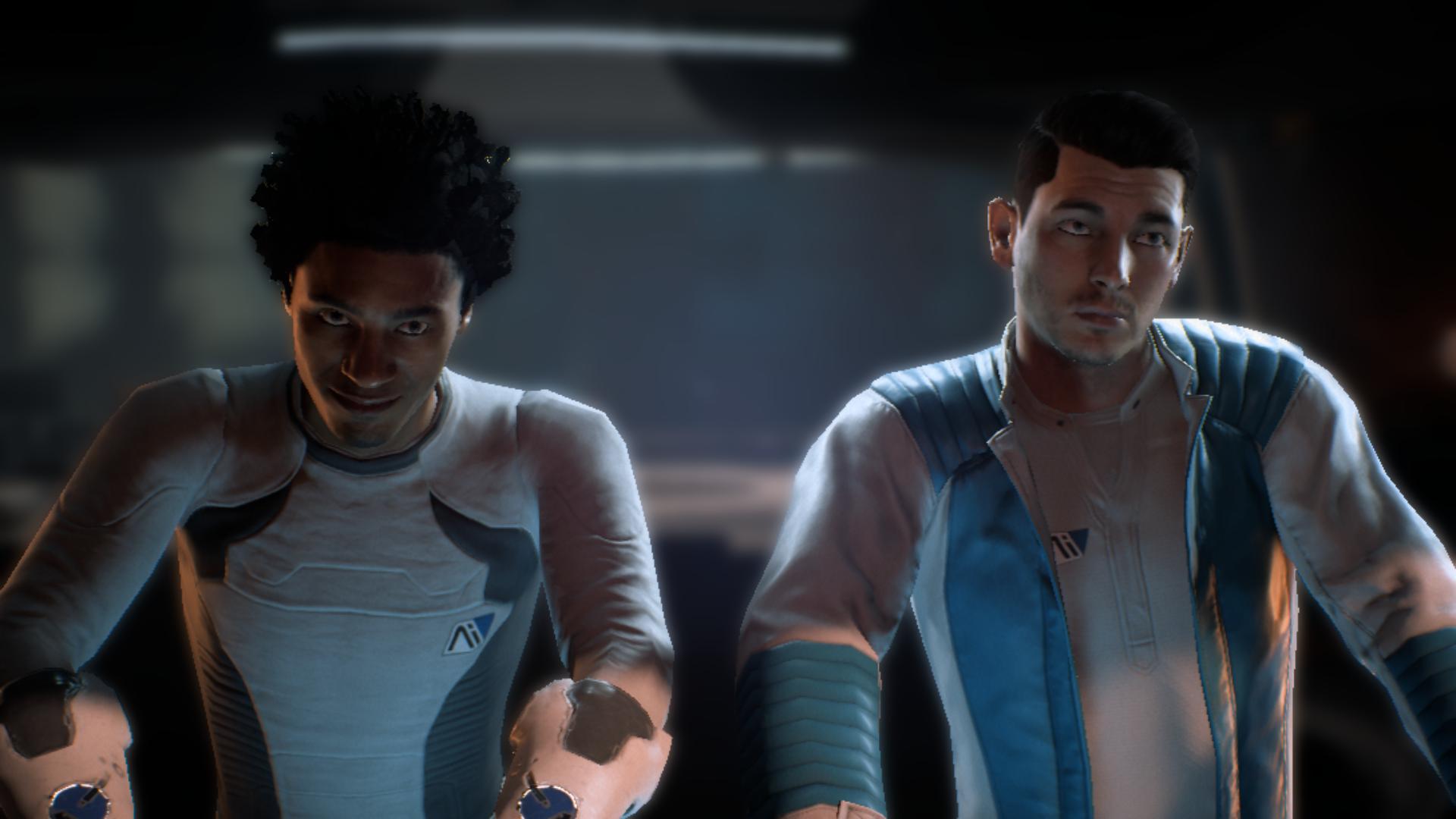
Fairly or unfairly, The Witcher 3: Wild Hunt has become a yardstick to measure other open-world RPGs against. It certainly manages to get some important things right—it balances a central storyline with sidequests that mostly seem important enough to engage with on the way, has characters and subplots who weave in and out of both, and reuses locations in a way that adds significance to them. I helped someone track down a lost goat over here, and won a round of cards over there.
But as well as being a useful yardstick for comparing games, The Witcher 3 is a convenient stick for beating them with. In comment sections it's a weapon of choice for whacking games that were created in different circumstances and lineages, as well as with very different aims. However, when it comes to Mass Effect: Andromeda there are a surprising number of things in common.
Both games involve a learning period early on during which players have to decipher which icons on the map point to things they'll find worthwhile, and which are distractions for completists. (Clearing monster nests in Velen is as boring as scanning more rare minerals on Eos; swimming out to every salvage point in Skellige as redundant as climbing to every mountaintop cache in Kadara.) And both games have similar quest design, the way they lead you from scene to scene by making you examine the environment, keep you updated with logs written in-character by an NPC, and have dialogue scenes that either alter how you portray the protagonist or become morality plays with unexpected outcomes.
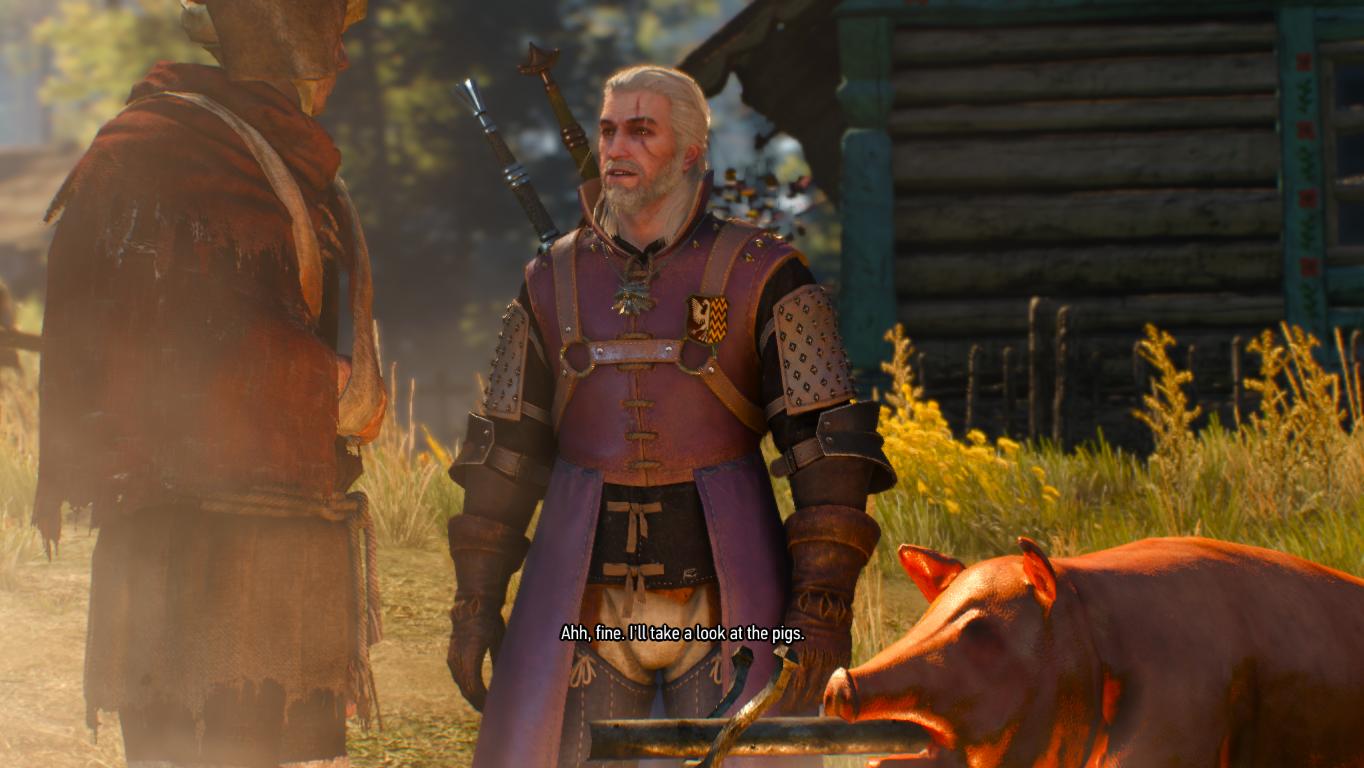
When I compare the two it's not just to add to the Andromeda thinkpiece dogpile, but to highlight trends in the wave of post-Skyrim RPGs that Andromeda joins.
So why is The Witcher 3 so revered, while Andromeda is, to put it charitably, divisive? From a high enough altitude they're both topographically the same, and even BioWare has compared them. It's only up close that the differences are obvious. Similar ideas, mechanics, and gameplay loops but with different presentation. And in story-rich games, presentation means writing.
When I compare the two it's not just to add to the Andromeda thinkpiece dogpile, but to highlight trends in the wave of post-Skyrim RPGs that Andromeda joins. It's more than just the singleplayer MMO or sci-fi Dragon Age: Inquisition it's been reduced to. To that end I'm looking at Andromeda's best mission, 'All In', a loyalty mission for Tempest crewmate Liam Koster. If you're playing Andromeda and you haven't reached it yet you should do that first. You'll need to set up an outpost on Eos and meet the angara, then keep chatting with Liam and checking your email between missions until he's ready. Even if you don't like Liam (you're not alone there), it's a mission worth doing. It might even raise your opinion of him.
The quest from The Witcher 3 I'm comparing it to is 'A Towerful of Mice'. Like 'All In' it's not part of the main thrust of the plot but instead given to you by an important side character you might get horizontal with later—here the sorceress Keira Metz. Both quests are set in a single, evocative location, and both are self-aware about the conventions of the genres they're in.
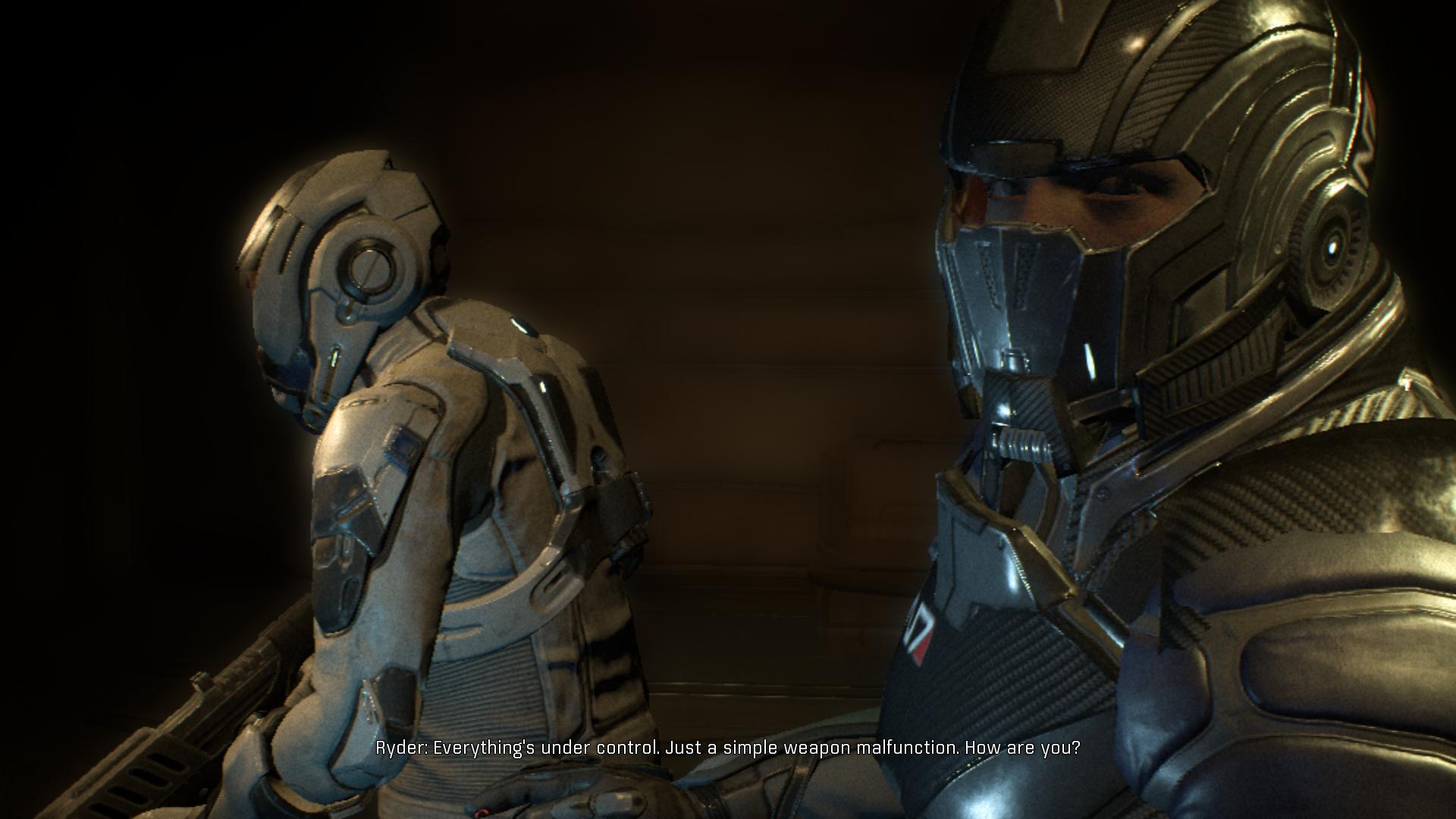
The voice In your ear
In The Witcher 3, Keira's voice acts as a criticism of games as a whole, of how clumsily they recycle ideas.
Before sending Geralt to Fyke Isle, the cursed spot where 'A Towerful of Mice' takes place, Keira Metz gives him a couple of magical items. One is a xenovox, which enables communication across great distance. Basically it's a radio, but one that can only be activated from Keira's end. It lets her act as the voice in your ear games love, whether it's Shodan in System Shock 2 or Atlus from BioShock. The Witcher 3 pokes fun at the cliche, having Geralt grumble at the imposition, and mostly gets away with it.
Keep up to date with the most important stories and the best deals, as picked by the PC Gamer team.
Andromeda also has a voice in your ear: SAM, the deathly dull AI who reminds you about mining for minerals. In 'All In' that changes. You're infiltrating a pirate ship hidden in a radioactive asteroid belt that reduces SAM's capabilities. Instead August Bradley, chief of the outpost Ryder founded on Eos, helps out along with his team of chatty engineers. The contrast with SAM is so sharp it must be deliberate—one flat voice replaced by a team of boisterous ones. The voice in your ear works best when that voice has a strong personality. SAM doesn't have that going for him, but Augie and his experts do, mocking the pirates they help you defeat and criticizing their junker of a ship. They sound like an audience making fun of a TV show. If only they could accompany you through the rest of the game.
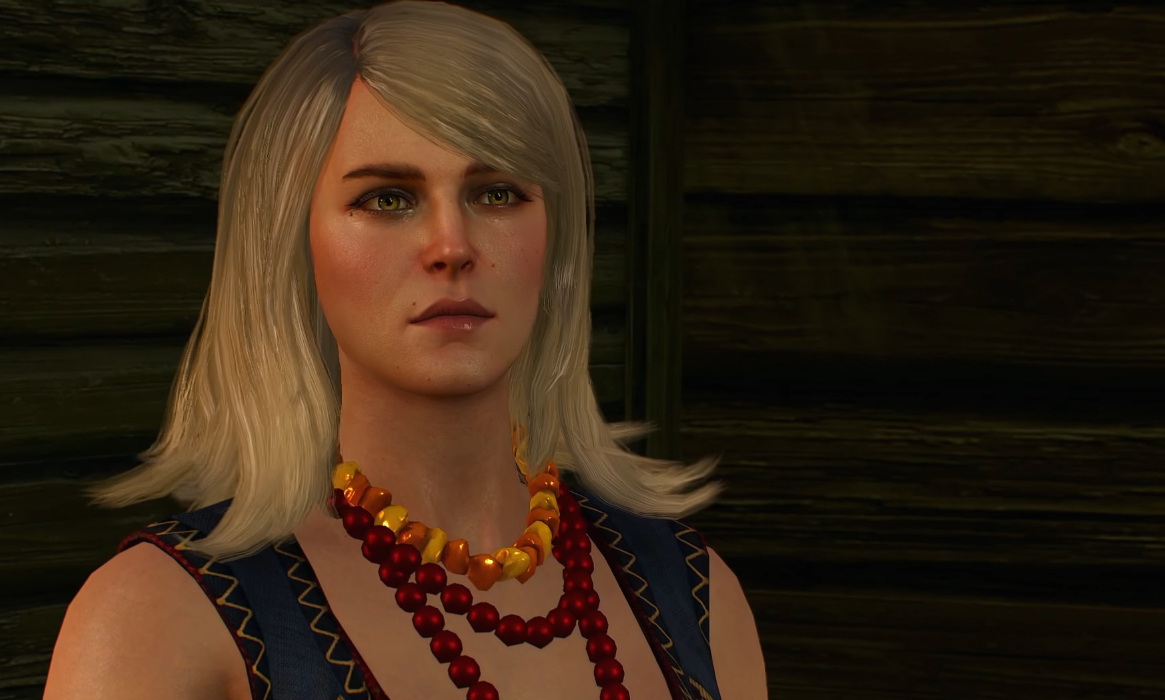
Both quests use the voice in your ear to good effect, but in Andromeda it’s a break from SAM, a better version of him. It feels like a criticism of the rest of Andromeda. In The Witcher 3, Keira's voice acts as a criticism of games as a whole, of how clumsily they recycle ideas because, say, Portal or Ultima VII did them—even as it does the same. “No chances these xenovoxes will catch on, with every mage using one?” Geralt asks. “Not the slightest,” Keira replies.
Scanning and mapping
To its credit Andromeda doesn't need to find ways of encouraging you to ignore the minimap because it doesn't have one.
Andromeda gives you a scanning omni-tool, which turns the world orange and highlights objects worth research points (part of its crafting system) or that can be interacted with. On the pirate ship these are consoles that open doors or give Augie and his engineers access to the ship's other systems—cameras that can be used to find the captives you're here to rescue, for instance. It gives you a reason to examine areas once you've cleared them of pirates.
The pirate ship 'All In' takes place on has its gravity altered during the mission, flipping first sideways and then upside down. It makes an unusual environment for both cover-shooting and jetpacking around, one you have to look at from all angles. Having to scan it highlights that, making it feel less pointless than the same activity can elsewhere. It also provides another excuse for SAM being less useful than normal—he can't map this location because, as he deadpans, “Floors are not walls, Pathfinder.”
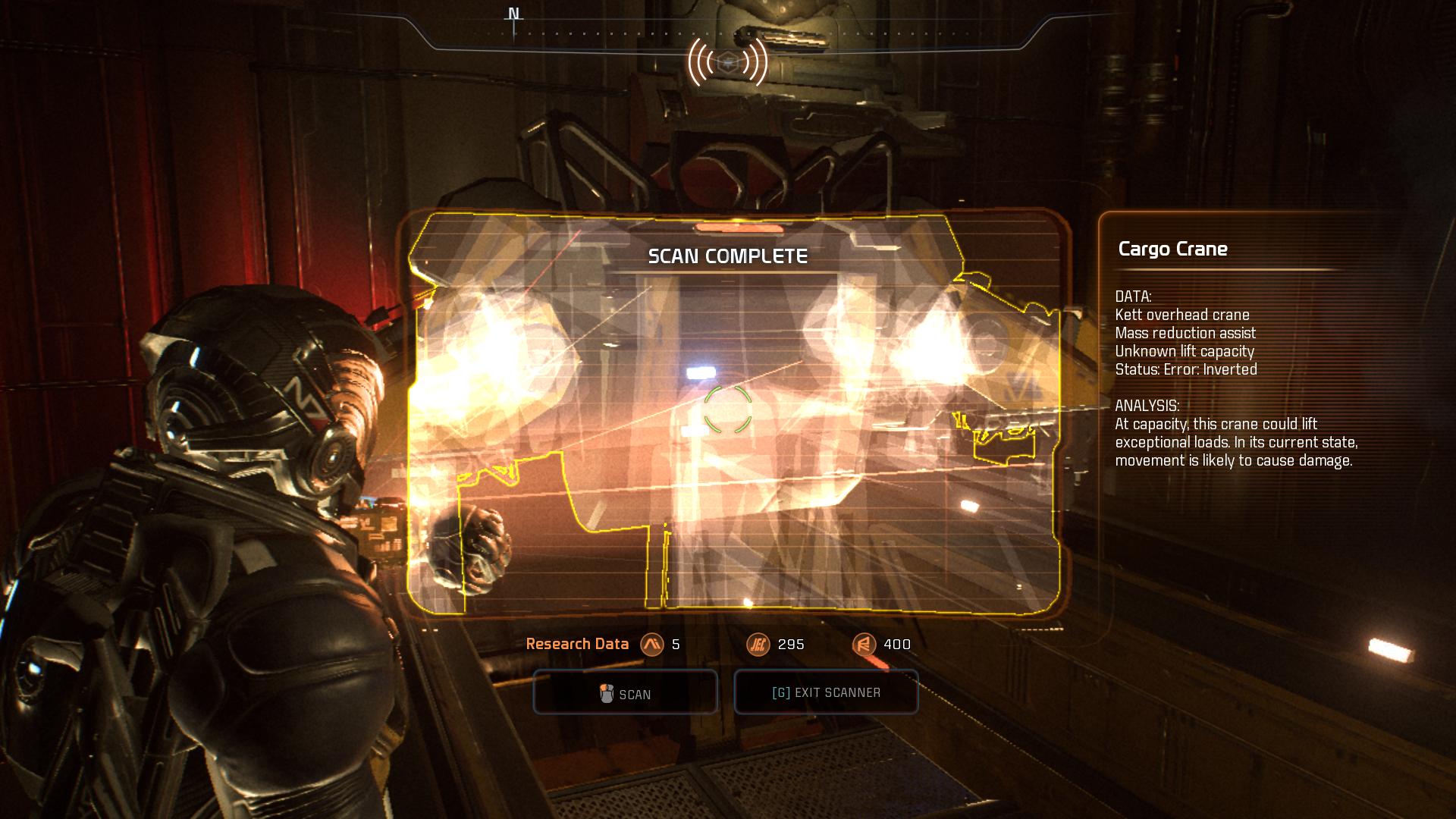
Normally Geralt scans with his Witcher senses, turning clues a convenient red. It's an idea plenty of games rely on, Arkham Asylum's 'detective vision' modified and applied everywhere. It's easy to see why: watch someone play an adventure game and you'll be baffled by the objects they didn't notice, environmental cues they were blind to. And if you think that's because they're bad at games, the same experience in reverse will prove that untrue. We all miss things the first time, walk right past stuff designers expected us to see. It's especially true in 3D spaces, and games with scanning mechanics are obvious, if clumsy, responses to that.
'A Towerful of Mice' goes one further. The second artifact Keira gives Geralt is a magic lamp that makes ghosts visible. To find out what caused the curse you have to shine this light on corpses scattered over the island and its tower, encouraging their spirits to re-enact their final moments. Again, it's familiar from System Shock 2 and BioShock, both of which used mood-setting spiritual theatre scenes when a simple audiolog wouldn't be dramatic enough.
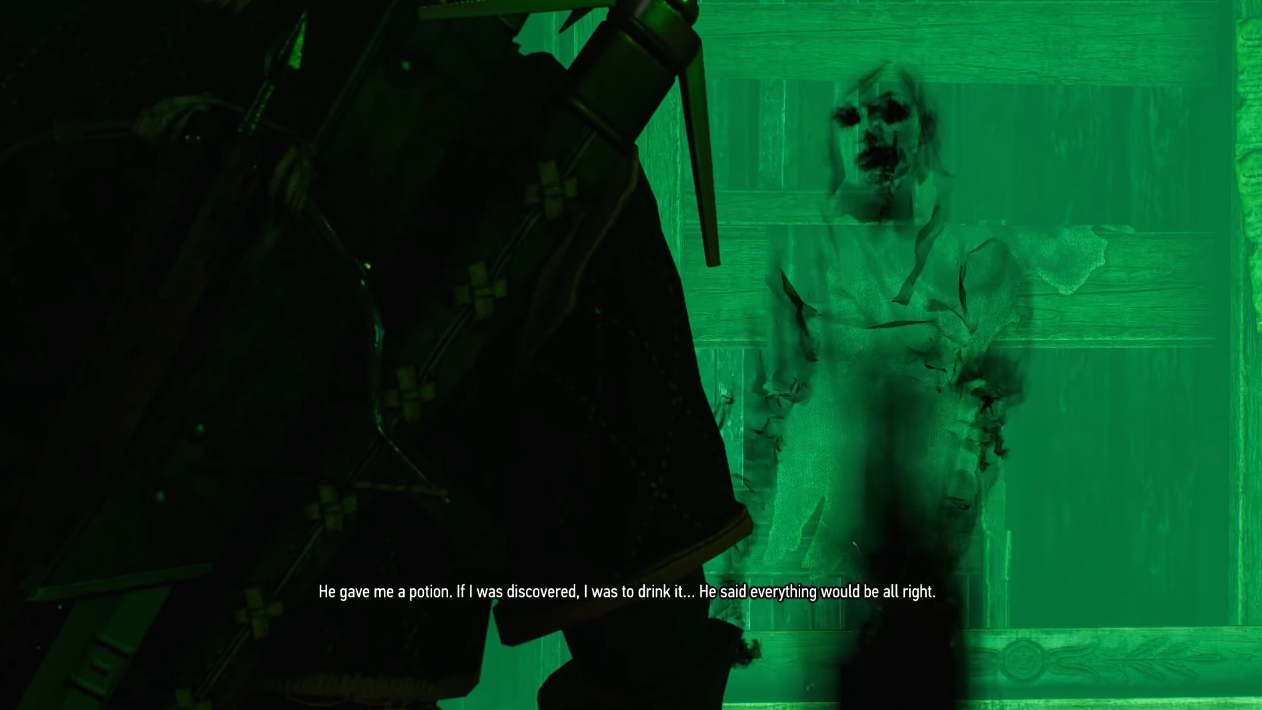
Finding the ghosts is optional. Watching them all does unlock an important dialogue choice but they can be skipped, and don't show up on the minimap. To find them you can't just follow the dotted line from place to place for once, which can take the fun out of things if you let it. To its credit Andromeda doesn't need to find ways of encouraging you to ignore the minimap because it doesn't have one.
In both games, scanning is far from ‘investigating.’ You point your magic eyes at something and the plot advances. The difference comes in quests where Geralt finds a corpse and stops to investigate, performing one of his impromptu autopsies. He dryly summarizes his conclusions, and makes a few comments about the state of their dental hygiene or the contents of their stomach. It's an opportunity to learn about the killing but also to learn a little more about him: that he's hardened enough to joke about cadavers and curious enough to want to know what a dead dwarf's packing in his trousers.
Insights such as that are rarer in Andromeda, where scans outside of 'All In' typically reveal simple facts about the quest with a brief comment: a damaged electrical panel, a possible murder weapon, a glyph.
Dialogue and decisions
I'd hoped the move away from earlier Mass Effects' renegade and paragon points would result in actual consequences from choices.
During 'All In' there are several dialogue choices involving Liam. The whole reason you're here is to rescue an angaran he leaked secrets to—essentially committing treason out of his eagerness to make friends with aliens—before she's interrogated. Liam takes the lead but makes predictably bad decisions, and you can choose between Andromeda's extreme poles of detached professionalism or bantersaurus buddypal to deal with his him. It's all about the relationship between Ryder and Liam, a test that can strengthen or weaken their friendship, though only slightly. The results are genuinely funny, the only times I laughed during Andromeda outside Drack's loyalty mission or when Peebee got drunk.
Rather than seasoning the whole quest with them, 'A Towerful of Mice' saves most of its dialogue choices for its finale. There's one ghost in the tower on Fyke Isle who can see you, who isn't trapped repeating her death and can be questioned. She claims to be the victim of the curse rather than responsible for it, but if you've done your homework and watched every ghost performance you get the option not to trust her. Rather than icons categorizing Geralt's responses by whether they're emotional or casual, you have to trust the summary you choose is going to result in him saying what you actually want. Fortunately the writing's strong enough that you can.
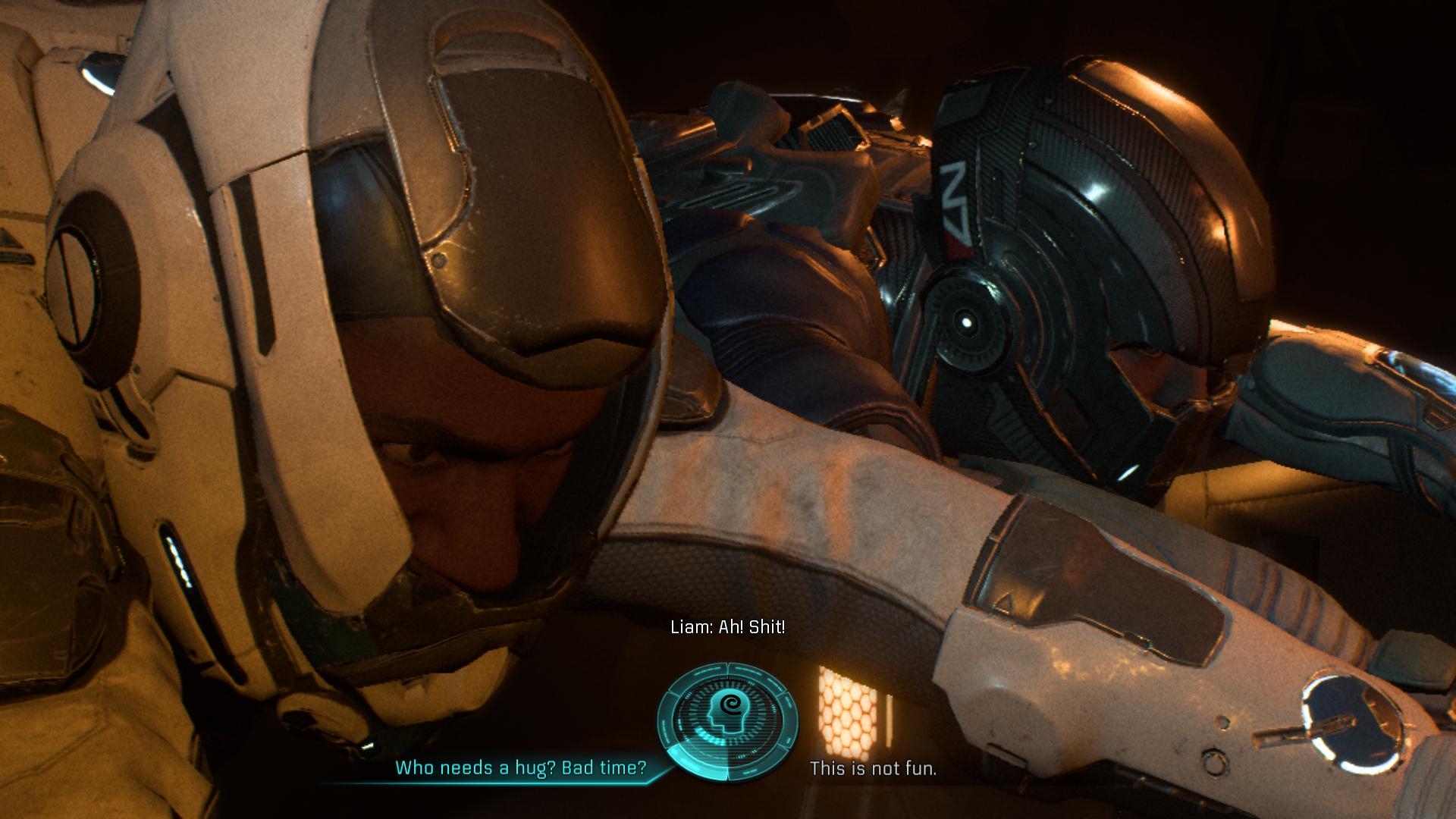
That's important, because when you say the wrong thing it should feel like your fault. The conclusion of 'A Towerful of Mice' comes down to that, with the result of your conversation with the ghost potentially leading to a vengeful spirit being freed to roam the countryside or an innocent man dying (and that's the good ending). Either way, the finale of the quest is going to have an impact and it’s going to haunt you.
Andromeda has dialogue choices that seem like they'll have consequences, making you choose between building a military outpost or a scientific research base, or between preserving the life of an AI and an angaran. The fallout is minor, however. I'd hoped the move away from earlier Mass Effects' renegade and paragon points would result in actual consequences from choices but instead it's just a matter of being mildly berated by one character and praised by another.
Some choices change who shows up to help during the finale and perhaps others will be followed up on by a sequel, but mostly the effect is a slight change to how great your crew think you are. If you've got to Liam's loyalty mission you've already earned his friendship even if you give him a stern talking to, and if you upset Drack by not taking his side in one of those Big Decision Moments he'll forgive you soon enough. In fact, if you don't romance someone by movie night, he'll be the one falling asleep on your shoulder.
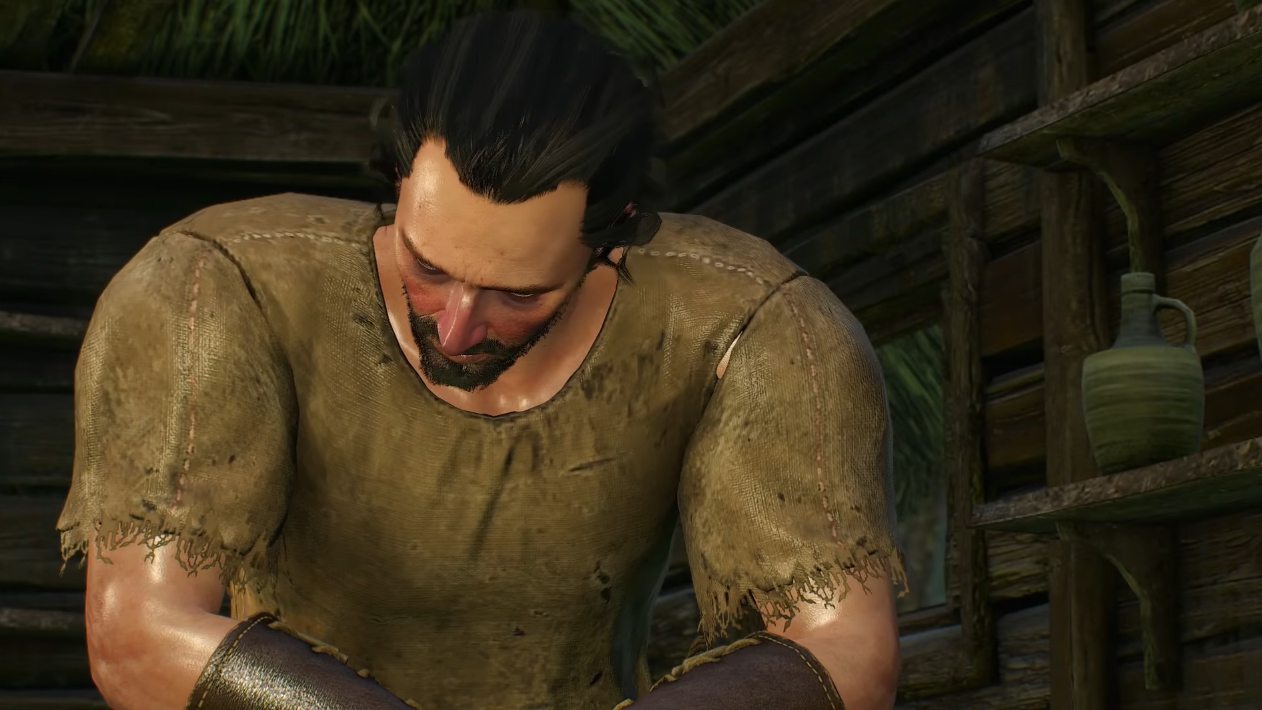
Dear diary
Andromeda's journal and codex is written by SAM, a black hole from which no personality can escape.
Finally, we come to the journals. The Witcher 3's quest log is written by the bard Dandelion, who embellishes his version of events as you experience them. According to him, Keira sends Geralt off to Fyke Isle with “a firm pat on the rear for good luck.” There's a list of objectives running beside his color commentary, but his unfolding version of the story makes it worth checking back even if you remember what to do next. The bestiary in another tab works the same way. It details the weaknesses of each creature you meet but also contains in-character ideas about their origins and ecologies. You come for the useful info about who is susceptible to Specter Oil, and stay for the world-building.
Andromeda makes a sharp contrast. Its journal and codex is written by SAM, a black hole from which no personality can escape. 'All In' has a similar checklist of objectives, but the plot summary is two sentences long and drab as a moth. There's nothing to draw you in further, and that's a shame. There's interesting stuff tucked away in Andromeda's codices, but it has none of the playful tone of the rest of the game—or Dandelion's descriptions. If he'd been the one writing about the angara practising “horizontal collectivism” he'd have done it with a nudge and a wink, and it'd be more readable for it.
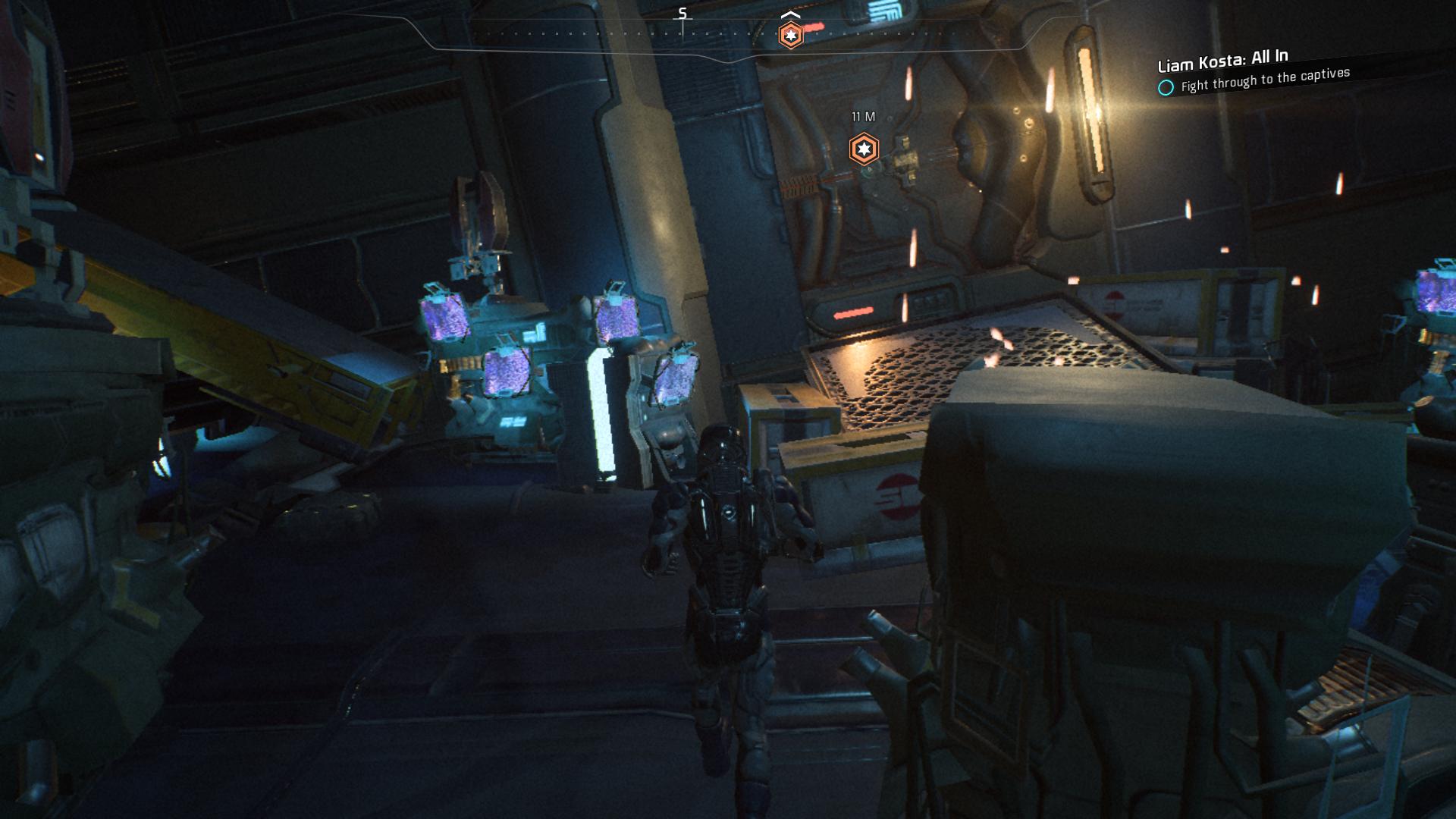
Both Mass Effect: Andromeda and The Witcher 3: Wild Hunt play in a broadly similar way. You choose a quest from your journal and ride your horse or the Nomad to the marker. You talk to anyone you can talk to and murder anyone you can't, examine the surroundings for a clue to the next marker, and move on. Maybe you spend some points on a new skill or craft a new pair of pants. Maybe you hit a miniature story that stands out from the rest.
Described so mechanically both games sound identical, yet we don't think of them that way. The Witcher 3 succeeds where Mass Effect fumbles because it rarely misses an opportunity to give Geralt or his supporting cast more character even while they're relaying plot points, because it batters you over the head with ways your actions affect its world, because it's aware enough of the cliches of the form to undercut itself when it gives in to them. These are the things that make it memorable, not its competent but second-hand open-world systems, and they're such a constant element we stop seeing them. 'All In' is an exceptional mission in Andromeda, one in which everything comes together to show the game at its best. The difference is that in Andromeda finding a memorable mission is a once-in-60-hours experience. In The Witcher 3, it's Tuesday.

Jody's first computer was a Commodore 64, so he remembers having to use a code wheel to play Pool of Radiance. A former music journalist who interviewed everyone from Giorgio Moroder to Trent Reznor, Jody also co-hosted Australia's first radio show about videogames, Zed Games. He's written for Rock Paper Shotgun, The Big Issue, GamesRadar, Zam, Glixel, Five Out of Ten Magazine, and Playboy.com, whose cheques with the bunny logo made for fun conversations at the bank. Jody's first article for PC Gamer was about the audio of Alien Isolation, published in 2015, and since then he's written about why Silent Hill belongs on PC, why Recettear: An Item Shop's Tale is the best fantasy shopkeeper tycoon game, and how weird Lost Ark can get. Jody edited PC Gamer Indie from 2017 to 2018, and he eventually lived up to his promise to play every Warhammer videogame.

